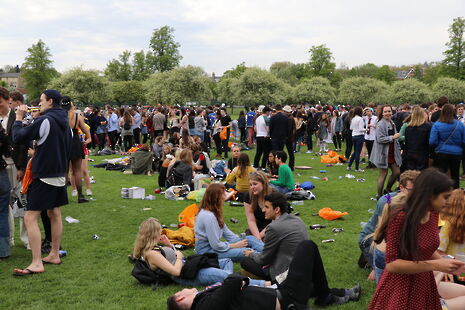Drinking societies still have a place in university life
With many freshers on the verge of being confronted with drinking societies for the first time, Eoghan McKenna argues that they’re merely an expression of our wider drinking culture

At Cambridge, being a member of a drinking society is the most notorious form of keeping one’s blood alcohol level high, and no doubt they will soon be pursuing fresh blood. These societies have been around for as long as anyone cares to remember. Drinking oneself into oblivion is their raison d’être, but they go beyond this. Issues of sexism, elitism and privilege pervade these societies, as any quick search of The Guardian will attest to.
But, as always with ancient universities, these criticisms are unlikely to go away, no matter which manifestation of Oxbridge activity is the subject. As such, the fundamental nature of the societies needs to be addressed in the context of their continuing to have a place in University life.
Not all societies are equal. Some are more infamous than others, and as such their activities are similarly infamous. The annual brawl between Girton’s ‘Green Monsters’ and Jesus’s ‘Caesarians’ displays the less tasteful side of the ‘elitist’ drinking cliques.
But the most understandably questionable aspect of these societies are the initiations. They take the form of inebriation ad nauseam, drinking games, and a garnish of sexual debauchery. It is this final aspect which earns particular derision, although the former two receive considerable criticism too.
Violence is inexcusable. But the excess – both liquid and physical – sits oddly in the critic’s microscope. The consumption of alcohol is widespread in universities, and drinking societies are not the only medium of consumption. For the student inebriati, the old adage “nothing in excess” doesn’t apply.
“Clubbing is widely accepted as an almost integral part of student life, yet drinking societies are widely condemned, despite the similarities in their attitudes to alcohol”
Excessive drinking for a drinking society most commonly occurs on a night spent at a nightclub. A Varsity article titled ‘Inside Cambridge Drinking Societies’ highlighted that the average night out will involve the consumption of at least the weekly recommended limit of 24 units. This will likely lead to the typical results of excessive drinking: amnesia and vomiting. So, ultimately, an alcohol-induced night with a drinking society and a night out clubbing normally are not wholly different. Clubbing is widely accepted as an almost integral part of student life, yet drinking societies are widely condemned, despite the similarities in their attitudes to alcohol.
Clubbing and drinking societies largely share the same functions, then. This is not to say that all those who go to a club end up deeply inebriated, but that it is commonplace and accepted. Drinking to oblivion is accepted as normal in most student circles, so the argument that the societies’ excessive imbibing renders them useless to university life does not stand up to scrutiny when compared to the activities of other students. In fact, the nature of drinking societies can render them a more acceptable way to consume excessively. As their very purpose is to drink, the possible outcomes are to be expected and can be more controlled.
With alcohol at their centre, drinking societies do not (usually) break laws. The club scene is not just littered with excess alcohol, but also the consumption of illicit substances. A recent investigation by The Tab revealed that although Cambridge had the lowest percentage of students consuming drugs of the universities surveyed, as many as 66 per cent of students here still said they’d tried them. The survey revealed that drug consumption – especially that which is inextricably linked with the clubbing scene – is widespread.
The consumption of illegal drugs should have no place in a university environment, never mind being widespread in society at large. Drug use has become so accepted as a part of university life that The Tab concluded that ‘Warwick and Cambridge are officially boring, coming close to last in every category’.
In terms of the debauchery of society initiations, participation is, again, voluntary. It is hypocritical to criticise these events – consensual as they are – while failing to mount an attack on the broader university community, in which similar things happen regularly.
The question of whether or not drinking societies should still have a place in Cambridge life comes down to whether or not people will continue to participate in them. Fundamentally, they are partaking in the legal and voluntary consumption of excess alcohol, just like clubbers and bar frequenters. If one thrives on such enjoyment, in an open society one should be able to enjoy such pastimes, whether right or wrong
 News / Judge Business School advisor resigns over Epstein and Andrew links18 February 2026
News / Judge Business School advisor resigns over Epstein and Andrew links18 February 2026 News / Gov grants £36m to Cambridge supercomputer17 February 2026
News / Gov grants £36m to Cambridge supercomputer17 February 2026 News / Hundreds of Cambridge academics demand vote on fate of vet course20 February 2026
News / Hundreds of Cambridge academics demand vote on fate of vet course20 February 2026 News / CUCA members attend Reform rally in London20 February 2026
News / CUCA members attend Reform rally in London20 February 2026 News / Union speakers condemn ‘hateful’ Katie Hopkins speech14 February 2026
News / Union speakers condemn ‘hateful’ Katie Hopkins speech14 February 2026










